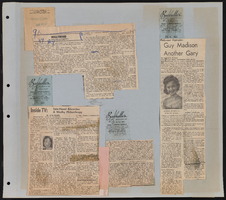Search the Special Collections and Archives Portal
Search Results
Gerald L. Connor oral history interview
Identifier
Abstract
Oral history interview with Gerald Connor conducted by James Bonnell on February 22, 1977 for the Ralph Roske Oral History Project on Early Las Vegas. Connor first discusses moving to Las Vegas, Nevada and serving as a pilot in the United States Air Force. He then discusses his education at the University of Nevada, Las Vegas and his church membership. Topics that Connor discusses during the interview also include changes in the school district and properties located in Downtown Las Vegas and the Las Vegas Strip, his political activity within the Democratic Party, the Helldorado Parades, and the early atomic tests at the Nevada Test Site.
Archival Collection
"Las Vegas: Snapshots of History" Photograph Collection
Identifier
Abstract
The "Las Vegas: Snapshots of History" Photograph Collection is comprised of photographic prints and slides as well as digital surrogates of photographic prints and ephemera representing architecture and events in Las Vegas, Nevada from approximately 1960 to 2017. Materials were donated by members of the Las Vegas community as part of a community scanning day sponsored by the National Endowment for the Humanities' Common Heritage grant. The majority of the collection documents landmarks in Las Vegas including the Stardust Resort and Casino, The Mint Las Vegas, Fremont Street, and the Desert Inn.
Archival Collection
Janet Savalli oral history interview
Identifier
Abstract
Oral history interview with Janet Savalli conducted by Irene Rostine on September 21, 1996 for the Women's Research Institute of Nevada (WRIN) Las Vegas Women Oral History Project. Savalli begins her interview by discussing her move to Las Vegas, Nevada as a child in 1945. Savalli then goes on to discuss her 46 year long career at the Southern Nevada Telephone Company. She describes rising through the company starting as an operator and ending as a community relations coordinator. Savalli discusses the company's merger with Sprint and the changes this brought about including the creation of a union and wage and benefits changes. Savalli ends her interview by talking about atomic testing, and how the testing grew to be a part of Las Vegas culture at the time.
Archival Collection
"Holiday in Japan" dancers joint oral history interview
Identifier
Abstract
Oral history joint interview with the "Holiday in Japan" dancers conducted by Claytee D. White on May 26, 2011 for the Boyer Early Las Vegas Oral History Project. The dancers present for the interview were Sachiko O. Thompson, Minoru Saito, Kazu Hamada, Kyoko Nakamura, Nobuko Suda, and Katsuko Tomoko Billman. The dancers begin by discussing their lives in Japan before coming to the United States in 1960 to perform their "Holiday in Japan" stage show. They describe their reactions to coming to the United States and compare it to life in Japan, as well as their reactions to coming to Las Vegas, Nevada specifically. They discuss performing their show at the New Frontier Hotel and Casino, Desert Inn Hotel and Casino, and Dunes Hotel and Casino. They describe their show, which presented Japanese culture to Western audiences, and the work that went into it. They end the interview by detailing their lives and careers after performances of the show concluded in 1961.
Archival Collection

Daniel Tafoya oral history interview: transcript
Date
Archival Collection
Description
Oral history interview with Daniel Tafoya conducted by Laurents Bañuelos-Benitez and Barbara Tabach on December 12, 2018 for the Latinx Voices of Southern Nevada Oral History Project. In this interview, Tafoya discusses his early life in Albuquerque, New Mexico. He talks about his father's life story, his educational experience with learning disabilities, and joining the United States Air Force. Tafoya describes his career in the military, and being stationed at Nellis Airforce Base. Lastly, Tafoya discusses with involvement with the Clark County School District (CCSD) and with the Latin Chamber of Commerce.
Text
Strutt Hurley Collection on the Southern Nevada Association of Pride, Inc. (SNAPI) and Las Vegas Gay Pride
Identifier
Abstract
The Strutt Hurley Collection on the Southern Nevada Pride Association, Inc. (SNAPI) and Las Vegas Pride (1989-2000) contains materials collected and produced by Strutt Hurley during her tenure as Director of Entertainment of SNAPI. Materials include meeting minutes, advertising contracts, Las Vegas Pride programs, and ephemera collected from Pride celebrations in Las Vegas, Nevada and other parts of the United States and the world.
Archival Collection
Wilson Family Papers
Identifier
Abstract
The Wilson Family Papers (1875-1918) document the personal and professional lives of James B. Wilson Sr., James B. Wilson Jr., and George Twison "Tweed" Wilson, early pioneers in Southern Nevada. The collection is comprised of personal correspondence, invoices and advertisements from the Wilson family business, the Sandstone Ranch, and photographs of the extended Wilson family.
Archival Collection

Transcript of interview with Florence McClure by Joanne Goodwin, January 24, 1996 & February 6, 1996
Date
Archival Collection
Description
Florence McClure came to Las Vegas later in her life, but the state felt her presence and the community her contributions as if she were a native daughter. Introduced to the League of Women Voters in 1967, McClure met her political mentor Jean Ford and learned how to practice the core elements of democracy. She put those tools to work in a number of ways, however her participation in the creation of the Rape Crises Center and her advocacy for locating the women’s prison near Las Vegas are two of her long-lasting efforts. Florence Alberta Schilling was born in southern Illinois where she enjoyed the security of a tight-knit family and the independence to test her abilities growing up. She graduated from high school and attended the MacMurray College for Women at Jacksonville. With the attack on Pearl Harbor in 1941, she began a series of jobs working for the war effort. She moved to Ypsilanti, Michigan with a girlfriend to work at the Willow Run Army Airbase and then moved to Miami, Florida where she worked for the Provost Marshall in the Security and Intelligence Division. She met her husband, James McClure, at the time and they married in 1945. During the next several years, they raised a family and moved around the country and to Japan with the military. McClure came to Las Vegas in 1966 as part of her work in the hotel industry which she engaged in after her husband’s retirement from the military. She had worked in California and Miami Beach, but it was Burton Cohen in Los Angeles who invited her to join him in a move to Las Vegas to build the new Frontier Hotel and Casino. Following the completion of the Frontier, she moved to the Desert Inn with Cohen in 1967 and worked as the executive office manager. After a few years, she decided to leave the industry and complete her college education. She graduated from UNLV in 1971with a BA in Sociology with an emphasis on criminology. She was 50 years old. McClure had been a member of the League of Women Voters for a few years at that point and had learned the political process from Jean Ford and workshops on lobbying. She had numerous skills that were waiting to be tapped when she attended an informational meeting on the incidence of rape in the Las Vegas valley. From that meeting, a small group of individuals, including McClure, began the organization Community Action Against Rape (later renamed the Rape Crisis Center) in 1973. It was the first agency in the area devoted to serving individuals who had been assaulted and changing the laws on rape. The organization’s first office was set up in McClure’s home. Over the next decade, she worked to change attitudes and reshape policy by constantly raising the issues of sexual assault with police officers, emergency room doctors, judges, and legislators. Her role as an advocate took her into hospital emergency rooms and courtrooms to assist victims. It also took her to the state legislator to lobby repeatedly for a change in laws. During this period, journalist Jan Seagrave gave McClure the nickname “Hurricane Florence” - a fitting moniker that captured the force with which McClure attacked the issue. As a result of her efforts and those of the people with whom she worked, we now 1) recognize rape as a crime of assault; 2) forbid the sexual history of a rape victim from being used against her in court; and 3) recognize marital rape. In addition to learning about Florence McClure’s activities, the reader of this interview will gain information on the role of civic organizations like the League of Women Voters in engaging the voluntary efforts of women in the post-war years.
Text
Transcript of interview with Hank Greenspun by Perry Kaufman, 1975
Date
Archival Collection
Description
Hank Greenspun discusses coming to Las Vegas in the 1940s, his journalistic endeavors, and some of the politics that affected him.
No release form is on file for this interview. The interview is accessible onsite only, and researchers must seek permission from the interviewee or heirs for quotation, reproduction, or publication. Please contact special.collections@unlv.edu for further information.
Text

